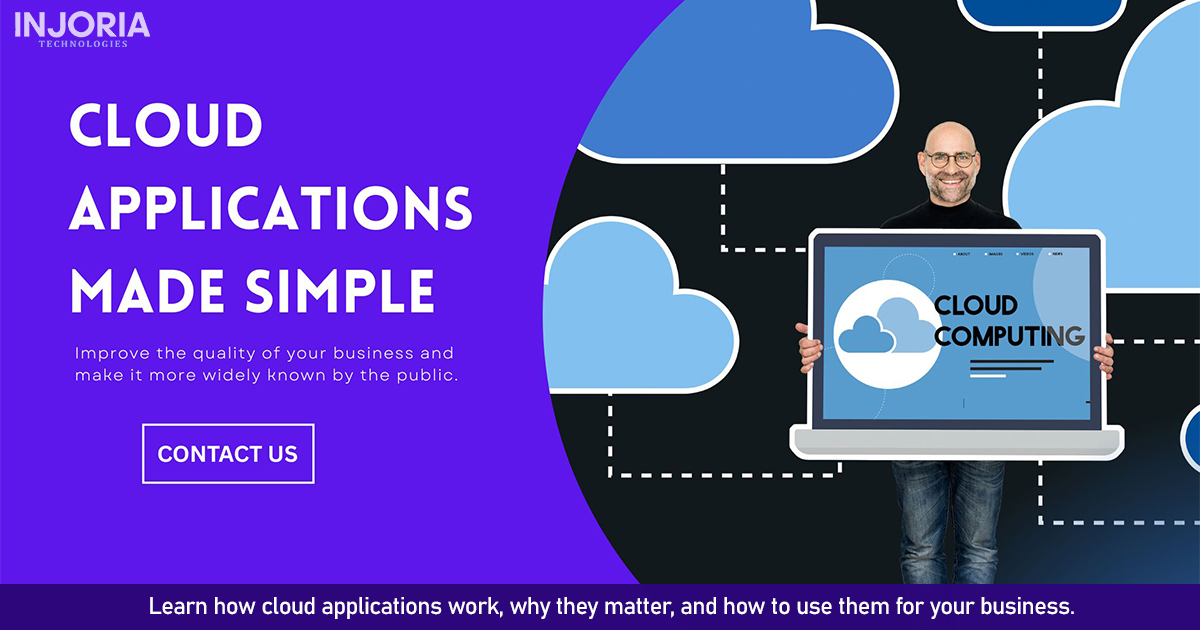In today’s time, technology is growing very fast. Because of this, many companies are now using cloud applications. These tools help them do their work in a better and faster way. Both small and large companies use cloud applications and IT solutions to manage their work, store data safely, and lower their costs. These applications also allow businesses to change their plans quickly when needed. Cloud apps are not simply something new. They are very helpful for day-to-day work. They also help teams work from different places at the same time. This is why more and more companies are starting to use cloud applications to improve how they work and stay strong in a fast-moving world. These are software tools that work using the internet and your personal device, such as a mobile phone, laptop, or desktop. These applications are different from regular software that is installed fully on your computer. In cloud applications, most of the processing and data storage happens on servers that are located in other places, not on your own device. The majority of cloud apps make use of a web browser or a small app. For example, in Gmail, you send and read your email in the browser, but all of your information is stored on Google servers. Your computer is not storing the emails to use, and the cloud handles and retains the information. This system is helpful for users. They do not need to install large programs or worry about updates and system management. They just need a device with access to the internet. That’s why cloud applications are now used by many people for personal and work-related tasks. Lower Costs: You do not need to buy expensive computers or servers. You pay only for what you use. Access from Anywhere: You can use the application from any place with internet. Faster Updates: Cloud providers update the software automatically. Better Teamwork: Many people can use the app together and work on the same data. Easy to Connect: These apps work well with other tools and services. They help businesses respond quickly when things change. For example, if your website suddenly gets a lot of users at the same time, a cloud-based app can manage the increase automatically. It will keep running smoothly without stopping or slowing down. These applications are also useful for teams that work together from different places. People can work on the same files, write, make changes, and talk to each other at the same time. It does not matter if someone is working from a different city or even a different country. This is important today because many people work from home or do not come to the office every day. Many businesses now rely on cloud-based IT solutions to support remote work, improve workflows, and stay competitive in the digital space. Cloud applications make it easier for everyone to stay connected and work as a team, no matter where they are. Healthcare: Hospitals use cloud-based systems to keep patient records so doctors can see them quickly. Finance: Banks use cloud tools to detect fraud or manage online payments. Online Shopping: E-commerce websites can handle a lot of visitors during busy times, like sales events. Manufacturing: Factories use cloud tools to manage parts, machines, and staff in many locations. In short, many industries now depend on cloud applications and trusted IT solutions to operate efficiently and securely. There are three main types of cloud services. Each one gives different control and features. 1. Infrastructure as a Service (IaaS) - This is a type of cloud service that allows you access to basic computing resources such as storage, internet network resources, and virtual servers. You are responsible for installing and managing your own software, apps, and data. This service is useful for companies that have technical teams or IT staff to handle these tasks. 2. Platform as a Service (PaaS) - Platform as a Service (PaaS) is a cloud service that helps you create and run applications without setting up servers or managing the system. The platform gives you the tools you need to develop software. It is a good choice for people who build apps, like developers. 3. Software as a Service (SaaS) - With SaaS, you use software online, and you do not install or manage it yourself. You do not need to install anything or handle updates. You can use it with internet and browser only. Services like email, file sharing, or video calls are common examples of SaaS tools. Cloud companies use many safety tools, like: Encryption (hiding your data) Identity checks (making sure only the right people can log in) Firewalls (blocking harmful traffic) Alarms for attacks or errors But users also have jobs to do, such as: Use strong passwords and two-step login. Check for security problems regularly. Give access only to people who really need it. Make sure all data is protected during use and storage. If both sides (the provider and the user) follow best practices, the system stays safe. There are many legal rules that cloud companies must follow. These include: GDPR (Europe – data protection) HIPAA (USA – health data) ISO/IEC 27001 (international data security) SOC 2 (data handling and trust) Before using a cloud service, make sure the provider follows the laws that matter to your company. You may also need to set your app to store data in the right country or keep track of who accessed the system. To keep cloud apps running well, you must watch them closely. Tools like: Prometheus and Grafana: Show real-time data CloudWatch: AWS’s monitoring tool ELK Stack or Fluentd: Collect and search through logs Know what normal performance looks like (baseline). Use IDs to track each request across systems. Use machine learning to find strange behavior. Rolling Updates: Update small parts slowly so users are not affected. Blue-Green Deployment: Keep two versions and switch traffic when the new one is ready. For growing apps:- Horizontal Scaling: Add more copies to handle more users. Vertical Scaling: Give more power (CPU or memory) to one server. Auto-scaling: Add or remove resources based on traffic. Also, plan for future growth and test often to avoid slowdowns or crashes.What Are Cloud Applications?
Simple Benefits Of Cloud Applications
Why Cloud Applications Are Important Today
Industries That Use Cloud Applications
Important Parts Of Cloud Applications
Cloud Service Models
Security And Rules
Keeping Data Safe
Following Laws and Standards
Taking Care Of Cloud Applications
Monitoring and Logging
Best Ways to Fix Problems
How to Update and Grow Your App
Blog Details
- Blogs
- <
- Cloud Applications Made Simple




(0) Comments: